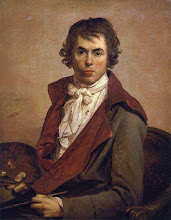I watched the debate on CNN, enjoying both the text of the question on the screen and the polling of independent voters in ohio streaming beneath.
After having sat through more than 40 minutes of AC 360, a number of consensuses have emerged among the panel of independents, republicans, and democrats. Obama clearly portrayed himself as a leader, as leaderly as John McCain. McCain was condescending towards Obama. Obama was, for the most part, clear with his answers. Independents loved ("liked more" Obama 65%, McCain 42%) Obama. Now, as most of election coverage is, much of the AC 360 time has been spent on the race, the versus.
Yet, what has been incredibly interesting is the critics (pundits) parsing of Obama's answer. His answers were clear, yet thoughtful and nuanced. And the pundits are treating them with care, and with, by gosh I'm gonna say it, thought. Obama's rhetoric has slightly changed the pundit discourse.
When Obama talked about the invasion of Pakistan, for example. The debate in the pundit sphere was not a superficial one. It was one of specific diction, "what does Obama mean when he says "unwilling" or "unable" about the pakistani government." And, in some of the clarifications of the point as well, "Obama never said he would invade pakistan." These comments were across party lines.
One of the things we mentioned last class, based mostly on Leighley, was this simple truism of media - the items, ideas, and policies that can be easily reduced to polar dynamics. Yet, just structurally speaking, the way the media reduces those things to polar opposites is through diction, through rhetoric. I published about the word "risky" recently. Words and phrases like welfare state, tax cut, bailout, etc. all carry partisan weights and preconceived opinions.
Obama's words were not built solely around those heavy words (he wasn't completely innocent). His answer on Pakistan was readily indicative of this. (By the way, I've included a picture of Pakistan to visually arrest the situation, also because its a pretty good graphic).

"Obama: Katie, it's a terrific question and we have a difficult situation in Pakistan. I believe that part of the reason we have a difficult situation is because we made a bad judgment going into Iraq in the first place when we hadn't finished the job of hunting down bin Laden and crushing al Qaeda.
So what happened was we got distracted, we diverted resources, and ultimately bin Laden escaped, set up base camps in the mountains of Pakistan in the northwest provinces there.
They are now raiding our troops in Afghanistan, destabilizing the situation. They're stronger now than at any time since 2001. And that's why I think it's so important for us to reverse course, because that's the central front on terrorism.
They are plotting to kill Americans right now. As Secretary Gates, the defense secretary, said, the war against terrorism began in that region and that's where it will end. So part of the reason I think it's so important for us to end the war in Iraq is to be able to get more troops into Afghanistan, put more pressure on the Afghan government to do what it needs to do, eliminate some of the drug trafficking that's funding terrorism.
But I do believe that we have to change our policies with Pakistan. We can't coddle, as we did, a dictator, give him billions of dollars and then he's making peace treaties with the Taliban and militants.
What I've said is we're going to encourage democracy in Pakistan, expand our nonmilitary aid to Pakistan so that they have more of a stake in working with us, but insisting that they go after these militants.
And if we have Osama bin Laden in our sights and the Pakistani government is unable or unwilling to take them out, then I think that we have to act and we will take them out. We will kill bin Laden; we will crush Al Qaeda. That has to be our biggest national security priority."
When Obama's raw, uncliched language forces the media to cover nuance, that means something.
Alas though, they are back on Palin.
 He suggests that condensed speech code is one that originates from the positionality of members in a family. For example, if you remember when your mother told you to do something because "she said so," she was employing condensed code, specifically in a hierarchical way. Other examples are: "Because you're a boy," "Because you're a child," etc.
He suggests that condensed speech code is one that originates from the positionality of members in a family. For example, if you remember when your mother told you to do something because "she said so," she was employing condensed code, specifically in a hierarchical way. Other examples are: "Because you're a boy," "Because you're a child," etc. 



